西方管理理论复习知识要点梳理
《西方管理理论》复习串讲提纲

西方管理理论复习串讲西方管理理论概括为:五个代、十大派、三个维度、五大线索。
五个代需要掌握的重要内容:1、时间2、背景3、重要代表人物4、代表理论5、重要实验、事件一、五个代:第一代:古典管理理论1、时间:19世纪末20世纪初2、标志:科学管理代替经验管理。
3、经济人假设:经济人特点:第一,人是由经济诱因来引发工作动机的,其目的在于获得最大的经济利益。
第二,经济诱因在组织的控制之下,因此,人被动地在组织的操纵、激励和控制之下从事工作。
第三,人以一种合乎理性的、精打细算的方式行事。
第四,人的感情是非理性的,会干扰人对经济利益的合理追求,组织必须设法控制个人的感情。
4、古典学派主要代表人物:美国泰罗(科学管理理论之父)的科学管理理论(侧重于个人效率)、法国法约尔的一般管理理论(侧重于组织效率)和德国马克斯 .韦伯(被称为组织理论之父)的行政组织理论(侧重于社会效率)。
5、管理重点:任务指派+制度古典管理理论学派(第一分支):(一)科学管理理论(泰罗—科学管理理论之父)1、科学管理有三个基本出发点:(1)谋求最高的工作效率,(2)谋求取得最高工作效率的手段,(3)劳资双方互相合作、共同努力。
2、科学管理四条原则:(1)动作的科学研究,代替凭经验的方法,(2)制定科学培训工人的方法,(3)与工人亲密协作,保证按科学方法实施,(4)分清劳资双方各自的职责。
3、在作业管理方面,泰罗制定了四项管理办法:(1)制定科学的管理办法,(2)制定科学培训工人的办法,(3)实行差别工资制度,(4)劳资双方精神革命——注意力不是关注分配,而是如何把蛋糕做大。
4、提出管理例外原则。
是指企业的高级管理人员把一般的日常事务授权下级管理人员去处理,而自己只保留对例外事项、重要事项的决策和监督权。
(二)一般管理理论(法约尔)1、对经营与管理作了区分:认为经营有六种活动,即(1)技术活动,(2)营业活动,(3)财务活动,(4)会计活动,(5)安全活动,(6)管理活动。
(完整版)西方管理学复习重点

复习重点一、简答题1、简述例外原则答:例外原则是指企业的高级管理人员把一般的日常事务授权下级管理人员去处理,而自己只保留对例外事项、重要事项的决策和监督权。
2、简述人际关系理论的主要观点P79答:(1)企业职工是“社会人”。
(2)生产效率的提高,关键在于满足职工的社会欲望,提高职工的士气。
(3)企业中实际存在着一种“非正式组织”。
3、简述需求层次理论与双因素理论的主要区别P93答:马斯洛的需要层次理论是就需要和动机而言,赫茨伯格的双因素理论是就满足需要的目标(诱因)而言。
双因素理论的重点是人们对待工作或劳动的态度,如保健因素是人们对外在因素的要求,激励因素是人们对内在因素即工作本身的要求。
4、简述经济人的主要特点答:第一,人是由经济诱因来引发工作动机的,其目的在于获得最大的经济利益。
第二,经济诱因在组织的控制之下,因此,人被动地在组织的操纵、激励和控制之下从事工作。
第三,人以一种合乎理性的、精打细算的方式行事。
第四,人的感情是非理性的,会干扰人对经济利益的合理追求,组织必须设法控制个人的感情。
5、简述系统管理的特点答:(1)以目标为中心,始终强调系统的客观成就和客观效果。
(2)以整个系统为中心,决策时强调整个系统的最优化而不是强调分系统的最优化。
(3)以责任为中心,每个管理人员都被分配给一定的任务。
(4)以人为中心,每个工作人员都被安排进行有挑战性的工作,并根据其工作成绩来付给报酬。
在系统管理体制下,工作的安排可能较为专门化,但系统能适应需要的变化而作出调整,以便鼓励职工在智力上发展和成长。
6、什么是目标管理答:目标管理是使管理人员和广大职工在工作中实行自我控制并达到工作目标的一种管理技能和管理制度。
7、简述行为科学揭示的人的行为一般规律答:人的行为是由动机所支配的,而动机又是由需要所引发的,人的行为一般来说都是有目的的,都是在某种动机的策动下为了某个目标。
当目标实现后,人就进行满足需要的活动,然后又有新的需要产生,再引发新的动机,这样周而复始,需要是人行为的原动力。
自考西方管理思想史

西方管理思想史复习重点1、群体基本特征:1由个人组成的。
2有共同的基本目标3内部是有组织的,并且这个组织是为了达到群体目标而客观存在的。
2、色诺芬写成《家庭管理》(又称《经济论》)一书。
这也是古希腊流传下来的,专门论述经济问题的第一部著作。
这部著作在管理思想上的主要贡献是:1首先提出可经济管理的研究对象。
2、首先提出了管理水平优劣的判别标准问题。
他认为,检验管理水平高低的标准是财富是否得到赠加,并认为管理的中心任务是得到更多的财富。
3、首先认识到了管理的中心任务是加强人的管理这一重要思想。
4、色诺芬分析了分工的重要性。
3、柏拉图著作最主要的是《理想国》(又译《国家篇》)4、亚里士多德的这一思想实质上揭示了管理矛盾的运动,变化和发展过程,即“目的→(物质+管理)→新的目的”的过程。
5、古罗马首先意识到现代企业的某些性质。
用建立公路体系的办法以保障军事调动和商品分配。
首创性地采取类似现代股份制公司的形式,向公众出售股票。
在罗马帝国的建立过程中,罗马人具有了集权、分权到再集权、分权到再集权的实践经验。
罗马人在长期军事生涯中,具备了遵守纪律的品格,以及以分工和权力层次为其基础管理职能设计能力。
托马斯·阿奎那出生于意大利以<<神学大全》最为著名,被作为中世纪经院哲学的百科全书。
被中世纪奉为“神学之父”。
马基雅维利著有《君主论》、《战争的艺术》、《夫罗伦萨史》等著作。
马基雅维利从唯心主义观点出发,把“权力欲望”和“财富欲望”看作是人性的基础。
马基雅维利的人性论是“人性本恶论”。
马基雅维利的“物质利益决定论”认为,人们冲突的根本原因是物质利益。
马基雅维利是较早认识到“物质利益”在管理中的重要性的思想家。
马基雅维利在对政治体制的研究中认为到:人民在国家生活中具有重要作用。
他指出共和制的优越性所在;人民比国王高明,比国王更会选举公职人员,更富有理智,在道德方面比国王更高尚。
马基雅维利论述了领导者的素质问题。
西方管理理论

第一讲、西方管理理论产生与发展概况
一、西方管理理论产生与发展的四个 阶段
(一)西方管理理论的孕育阶段 1、国外古代社会的管理思想 (1)苏美尔人的城市管理思想 (2)古巴比伦的管理思想 (3)希伯来人的管理思想 (4)古代埃及的管理思想 (5)古代希腊的管理思想 (6)古罗马的管理思想
(三)正确认识技术与管理的关系,在重视 技术的同时也要重视管理
四、一般管理理论有关管理概 念与管理职能的观点
法约尔的主要贡献是对管理的职能进行分析 界定。提出了大经营小管理的概念。法约尔 认为经营与管理之间有着严格的区别,经营 主要包括:技术活动、商业活动、财务活动、 安全活动、会计活动。管理主要包括:计划、 组织、指挥、协调、控制。
1、人际关系理论阶段
人际关系理论是以乔治.埃 尔顿.梅奥(1880—1949)等 人从1924到1932年通过著名 的“霍桑试验”提出来的理 论。
2、个体行为理论
个体行为理论是以亚伯拉罕.
马斯洛等人提出来的一种行
梅奥
为科学理论。
3、团体行为理论 团体行为理论主要研究团体内 人与人关系的协调,如何增强 团体合力和团体内聚力。
1、费雷德里克.温斯洛.泰罗 泰罗(1856—1915)是古
典管理理论杰出的代表。
2、亨利.法约尔 法约尔(1841—1925)是以研究 一般管理理论即职能管理理论 而著称的法国管理学家。
3、马克斯.韦伯
韦伯(1864--1920)是理想的行 政组织理论管理学说创始人。
泰罗 法约尔
( 三 )行为科学理论阶段
(三)既要重视管理教育,又要重视管 理理论教育
复习思考题
·1、科学管理的基本出发点是什么? ·2、科学管理应遵循哪四条原则? 3、简述科学管理理论的主要管理措施
西方管理思想史重点
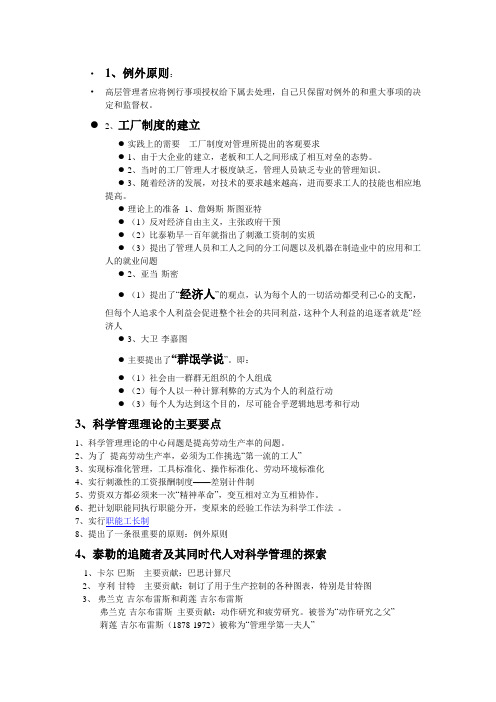
•1、例外原则:•高层管理者应将例行事项授权给下属去处理,自己只保留对例外的和重大事项的决定和监督权。
●2、工厂制度的建立●实践上的需要工厂制度对管理所提出的客观要求●1、由于大企业的建立,老板和工人之间形成了相互对垒的态势。
●2、当时的工厂管理人才极度缺乏,管理人员缺乏专业的管理知识。
●3、随着经济的发展,对技术的要求越来越高,进而要求工人的技能也相应地提高。
●理论上的准备1、詹姆斯·斯图亚特●(1)反对经济自由主义,主张政府干预●(2)比泰勒早一百年就指出了刺激工资制的实质●(3)提出了管理人员和工人之间的分工问题以及机器在制造业中的应用和工人的就业问题●2、亚当·斯密●(1)提出了“经济人”的观点,认为每个人的一切活动都受利己心的支配,但每个人追求个人利益会促进整个社会的共同利益,这种个人利益的追逐者就是“经济人●3、大卫·李嘉图●主要提出了“群氓学说”。
即:●(1)社会由一群群无组织的个人组成●(2)每个人以一种计算利弊的方式为个人的利益行动●(3)每个人为达到这个目的,尽可能合乎逻辑地思考和行动3、科学管理理论的主要要点1、科学管理理论的中心问题是提高劳动生产率的问题。
2、为了提高劳动生产率,必须为工作挑选“第一流的工人”3、实现标准化管理,工具标准化、操作标准化、劳动环境标准化4、实行刺激性的工资报酬制度——差别计件制5、劳资双方都必须来一次“精神革命”,变互相对立为互相协作。
6、把计划职能同执行职能分开,变原来的经验工作法为科学工作法。
7、实行职能工长制8、提出了一条很重要的原则:例外原则4、泰勒的追随者及其同时代人对科学管理的探索1、卡尔·巴斯主要贡献:巴思计算尺2、亨利·甘特主要贡献:制订了用于生产控制的各种图表,特别是甘特图3、弗兰克·吉尔布雷斯和莉莲·吉尔布雷斯弗兰克·吉尔布雷斯主要贡献:动作研究和疲劳研究。
西方管理史,重点笔记

马斯洛需要层次理论1 有人五种需要,重要性和发生顺序依次是生理需要安全需要社交需要尊重需要自我实现需要2对于这五种需要,人类不能都得到满足,低层次的需要更容易得到满足,高层次的满足比率更小3 只有占主导地位的需要才是驱动人的行为的主要动因巴纳德关于经理人员的职能巴纳德是社会系统学派的创始人1 建立和维持一个信息沟通系统2 从不同的组织成员那里获得必要的服务3 规定组织共同目标,并用各个部门的具体目标来加以阐明科学管理的三个基本出发点1效率至上,管理的中心问题是提高劳动生产率2 为了谋求最高的工作效率可以采取任何办法 3 劳资双方应共同协作法约尔十四项管理原则1劳动分工2权利和责任3纪律4统一指挥5统一领导6个人利益服从集体利益7 人员的报酬8集中9等级制度10 秩序11 公平12 人员的稳定13 首创精神14 人员的团结领导方式连续统一理论这是美国坦难鲍姆和施密特所提出的一种领导理论,主要内容是,一个好的领导方式取决于领导者和被领导者所处的环境,任务的性质,职权的关系和团体的动力等。
领导方式就是经理运用职权程度与下属自由度之间的不同比例组合。
学习型组织的主要特征1组织成员拥有一个共同的愿景,它源于个人愿景而又高于个人愿景2组织由多个创造性个体所组成3善于不断学习,这是学习型组织的主要特征4地方为主的扁平式结构5自主管理6组织边界将被重新界定7员工家庭与事业的平衡8领导者要扮演新角色古典管理理论的基本原则1为组织机构配备合适的人员2 一个主管或一个人管理的原则3统一指挥原则4专业参谋和一般参谋5工作部门化原则6授权原则7权责相符原则8控制幅度原则古典管理理论历史贡献1古典管理理论是现代管理理论的基础,对现代管理理论的研究有着巨大的指导和借鉴作用2古典管理理论对今天的企业管理有着巨大的指导作用3古典管理理论极大的推动了生产力的发展古典管理理论缺点1对人性的研究没有深入2仅仅把管理的对象看作是一个客观的存在,没有把管理对象上升到系统来认识3着重点是放在管理客观存在的内部4把研究的重点放在企业内部,而对企业的发展环境考虑得比较少泰勒科学管理的主要内容一,作业管理方面 1 制定科学的工作方法2制定培训工人的科学方法3 实行激励性的报酬制度二组织管理方面1把计划的职能和执行的职能分开2提出了职能工长制3提出了例外原则三管理哲学方面他认为,科学管理的实质在于劳资双方的心理革命赫茨伯格双因素理论他把企业中有关因素分为满意和不满意因素1满意因素可以得到满足,它们称为激励因素,激励因素如果得到满足,可以激励个人或者集体以一种成熟的方式成长,使工作能力不断提高。
西方管理学的考试资料(完整版本)

1、西方管理理论的三次重大变革。
1科学管理理论的产生2行为科学理论的产生3现代管理理论的产生▲2、科学管理理论的主要内容及其借鉴意义。
㈠效率至上㈡合作双赢㈢科学代替经验㈣“经济人”假设1、深刻理解提高劳动生产率的重要意义,自觉把提高劳动生产率作为管理的中心问题。
2、管理的实质在于劳资双方的密切合作,而劳资双方的密切合作的基础又在于建立共同利益机制和思想情感的沟通。
3、正确认识技术与管理的关系,在重视技术的同时,也要重视管理;在引进技术的同时,也要引进管理。
4、正确认识加强管理基础工作对提高劳动生产率的重要性。
3、法约尔对管理理论的贡献。
㈠首次区分了经营和管理的概念㈡系统地提出并阐述了管理的五大职能管理的五个职能——计划、组织、指挥、协调和控制。
㈢从一般管理原理的角度提出了管理的十四条一般原则㈣强调了进行管理教育和建立管理理论的必要性4、人际关系理论的主要观点。
㈠企业职工(人)是“社会人”㈡生产效率的提高,关键在于满足职工的社会欲望,提高职工的士气㈢企业中实际存在着一种“非正式组织”▲5、个体行为理论与人力资源管理对策。
个体行为理论是行为科学理论的一个非常重要的分支。
它包括三个理论体系,即需要理论、激励理论和人性理论。
需要理论中最著名的是马斯洛在1954年提出的需求层次理论。
1、主要理论观点⑴人的需要按重要性和先后次序形成五个需要等级:①生理需要→②安全需要→③交往需要→④尊重需要→⑤自我实现需要。
⑵人的需要是分层次的,是从低级到高级的发展过程。
⑶在某一特定时期的多层次需要中总有某一级别的需要处于主导地位。
⑷需要等级与满足的难易程度相关联,需要等级由低到高其满足程度则由易到难。
激励理论主要包括四种类型:一是内容型激励理论(如双因素理论);二是过程型激励理论(如期望理论和公平理论);三是行为修正型激励理论(如强化理论);四是内外综合型激励理论。
人性假设理论是管理理论研究的基本出发点、理论前提和基本依据。
西方管理学重点

西方管理学重点(注:如是论述,请结合实际。
)1简述科学管理理论的主要管理措施及其内容.答:(一)定额管理1提出企业要设立一个专门制定定额的部门或机构,并认为设立这样的机构不但在管理上是必要的,而且在经济上也是核算的。
2.通过各种实验和测量,进行劳动动作研究和工作研究,确定工人“合理的日工作量”,即劳动定额。
3、根据定额完成情况,实行差别计件工资制,使工人的贡献大小与工资高低紧密挂钩。
(二)差别计件工资制1、设立专门的制定定额部门2、制定差别工资率3、工资付给工人而不是付给职位(三)挑选第一流工人就是指在企业人事管理中,要把合适的人安排到合适的岗位上。
(四)工具标准化和操作标准化只有实行标准化,才能使工人使用更有效的工具,采用更有效的工作方法,从而达到提高劳动生产率的目的;只有实现标准化,才能使工人在标准设备、标准条件下工作,才能对其工作成绩进行公正合理的衡量。
(五)计划职能与执行职能分开实际是把管理职能与执行职能分开。
(六)在管理控制中实行例外原则是指企业的高级管理人员把一般的日常事务授权给下级管理人员去处理,而自己只保留对例外事项、重要事项的决策和监督权。
2、简述公平理论的主要内容.答:“公平理论”是由美国行为学家亚当斯1965年提出的激励理论观点。
“公平理论”是建立在报酬比较基础上的一种理论。
该理论认为,一个人的工作动机不仅受到获得与付出的相对比较的影响,人们不仅关心个人的努力所获得的绝对报酬额,而且关心同别人比较报酬的相对报酬量。
3、士气高的团体具有什么特征。
答:七个方面的特征:1、团体的团结是由于团体的凝聚力而不是来源于外部的压力;2、团体内的成员没有分裂为互相敌对的小团体倾向;3、团体本身具有适应外部变化和处理内部冲突的能力;4、团体成员之间有强烈的认同感和归属感;5、团体成员都明确了解团体的目标;6、团体成员都拥护和支持团体的目标和领导者;7、团体成员认为团体有存在的价值,并愿意继续维护它的存在。
西方管理思想史知识点整理

P17 泰勒科学管理理论的基本要点
◆合理确定工作定额,提高劳动生产率
◆挑选“第一流的工人”
◆标准化管理
◆刺激性的计件工资制
◆计划职能和执行职能
◆实行职能工长制
◆例外原则
◆管理哲学:资本家和工人之间的“精神革命”
P27 法约尔的一般管理理论
◆泰勒管理与法约尔管理的区别
◆管理活动和人员素质
◆管理五要素
◆十四项管理原则
P34韦伯的行政记全组织理论
◆权利的分类
◆理想的行政管理组织管理体制
P45行为科学理论
◆胡戈·蒙斯特伯格:工业心理学
◆亨利·丹尼尔:重视管理中的人的因素;主张自上而下的组织设计方式;创办交替
管理信息的组织;
◆奥利弗·谢尔登:强调管理中人的因素;企业的社会责任;管理的整体性;管理的
职能划分
◆梅奥与霍桑实验
◆人际关系学说与行为科学的建立
◆马斯洛的需求层次理论
◆赫茨伯格的双因素理论
◆麦格雷戈的“X理论—Y理论”(P.65)
◆斯托格蒂和沙特尔的双因素模式(P.74)
P.120战略管理理论
◆钱德勒《结构与战略》
◆安德鲁斯:战略规划的划分
◆迈克尔·波特(通用型战略、竞争优势理论、钻石理论、集群战略◆普拉哈拉德与哈默尔(核心能力理论、扩张与杠杆的作用
P.139全面质量管理理论
◆戴明的十四要点、戴明循环
◆朱兰的“80/20原则”
◆费根鲍姆—全面质量管理之父(影响质量管理的基本因素)
P164.组织文化与文化管理理论
◆7S管理理论
◆威廉·大内的“Z理论”
◆迪尔与肯尼迪的公司文化理论(文化要素)。
西方管理思想史重点(新)
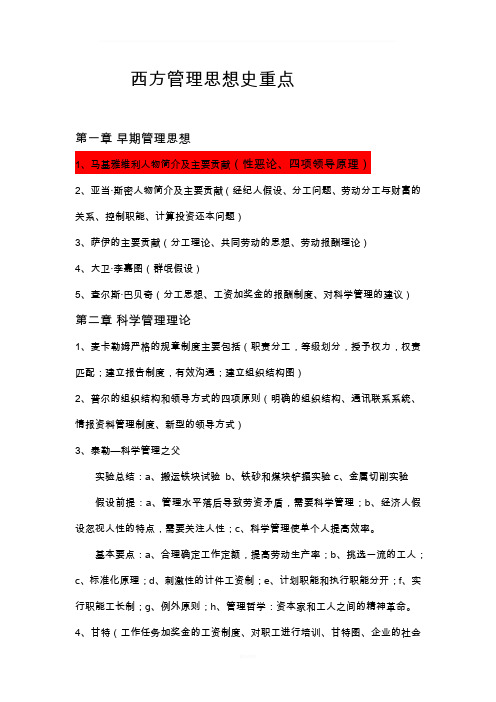
西方管理思想史重点第一章早期管理思想1、马基雅维利人物简介及主要贡献(性恶论、四项领导原理)2、亚当·斯密人物简介及主要贡献(经纪人假设、分工问题、劳动分工与财富的关系、控制职能、计算投资还本问题)3、萨伊的主要贡献(分工理论、共同劳动的思想、劳动报酬理论)4、大卫·李嘉图(群氓假设)5、查尔斯·巴贝奇(分工思想、工资加奖金的报酬制度、对科学管理的建议)第二章科学管理理论1、麦卡勒姆严格的规章制度主要包括(职责分工,等级划分,授予权力,权责匹配;建立报告制度,有效沟通;建立组织结构图)2、普尔的组织结构和领导方式的四项原则(明确的组织结构、通讯联系系统、情报资料管理制度、新型的领导方式)3、泰勒—科学管理之父实验总结:a、搬运铁块试验b、铁砂和煤块铲掘实验c、金属切削实验假设前提:a、管理水平落后导致劳资矛盾,需要科学管理;b、经济人假设忽视人性的特点,需要关注人性;c、科学管理使单个人提高效率。
基本要点:a、合理确定工作定额,提高劳动生产率;b、挑选一流的工人;c、标准化原理;d、刺激性的计件工资制;e、计划职能和执行职能分开;f、实行职能工长制;g、例外原则;h、管理哲学:资本家和工人之间的精神革命。
4、甘特(工作任务加奖金的工资制度、对职工进行培训、甘特图、企业的社会责任)5、吉尔布雷斯夫妇(提出了动作研究和动作经济原则、疲劳研究、认识到工人工作和环境之间的关系)6、埃默森(十二条效率原则、直线参谋型组织结构)7、库克(把科学管理原理应用于大学管理、市政管理,重视人的因素)第三章古典管理学理论体系的形成1、法约尔——工业管理理论之父A、管理活动:技术活动、商业活动、财务活动、安全活动、会计活动、管理活动B、身体、智力、品德、一般文化、专业知识、经验C、管理的五要素:计划、组织、指挥、协调、控制D、14项管理原则评价法约尔(全面)2、韦伯——组织理论之父(理想的行政组织、权力的分类、理想的行政组织管理体制的主要特点:明确的组织目标、明确的职能分工、层级节制的权力链条、专业的培训机制、合理合法的人事制度和薪酬制度、组织管理的非人格化、严格遵循规章制度和办事程序、业务处理和传递以书面文件为准)对官僚制的评价3、厄威克(古典管理理论的系统化;组织的八原则原理;组织设计)4、古立克(管理职能系统化POSDCORB:计划、组织、人事、指挥、协调、报告、预算)5、古典管理理论的评析优点:a管理的重要性和普遍性,为现代管理轮奠定基础;b提高劳动生产率和工作效率以及组织结构优化缺点:a、仅仅注重经济人假设把人当作机器;b、没有考虑企业所处的环境;c、只注重生产率,忽视消费和市场;d、虽然提出了一些规律性的原则,但没有把管理对象上升到系统层次第四章行为科学理论1、蒙斯特伯格:a、对人进行研究,心理学应用于工业领域,成为提高工作效率的方法;b、科学管理涵盖工业心理学,相辅相成;c、研究工业心理学,主要研究疲劳、职业指导、考核和工作安置。
自考西方管理思想史复习资料
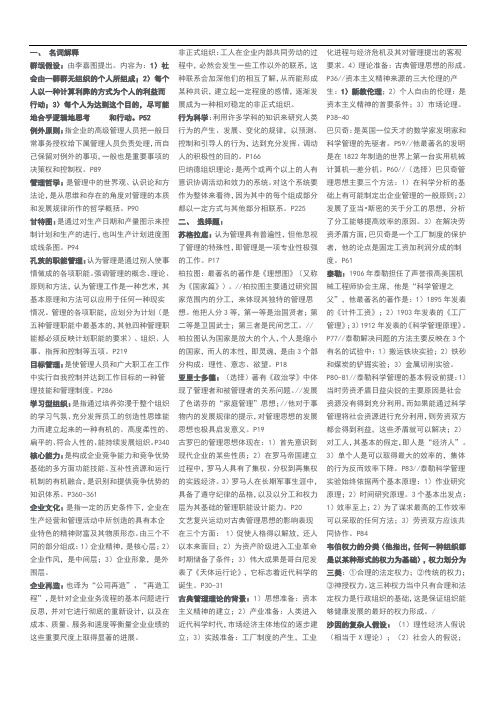
一、 名词解释群氓假设:由李嘉图提出。
内容为:1)社会由一群群无组织的个人所组成;2)每个人以一种计算利弊的方式为个人的利益而行动;3)每个人为达到这个目的,尽可能地合乎逻辑地思考 和行动。
P52例外原则:指企业的高级管理人员把一般日常事务授权给下属管理人员负责处理,而自己保留对例外的事项,一般也是重要事项的决策权和控制权。
P89管理哲学:是管理中的世界观、认识论和方法论,是从思维和存在的角度对管理的本质和发展规律所作的哲学概括。
P90 甘特图:是通过对生产日期和产量图示来控制计划和生产的进行,也叫生产计划进度图或线条图。
P94孔茨的职能管理:认为管理是通过别人使事情做成的各项职能。
强调管理的概念、理论、原则和方法,认为管理工作是一种艺术,其基本原理和方法可以应用于任何一种现实情况。
管理的各项职能,应划分为计划(是五种管理职能中最基本的,其他四种管理职能都必须反映计划职能的要求)、组织、人事、指挥和控制等五项。
P219目标管理:是使管理人员和广大职工在工作中实行自我控制并达到工作目标的一种管理技能和管理制度。
P286学习型组织:是指通过培养弥漫于整个组织的学习气氛、充分发挥员工的创造性思维能力而建立起来的一种有机的、高度柔性的、扁平的、符合人性的、能持续发展组织。
P340 核心能力:是构成企业竞争能力和竞争优势基础的多方面功能技能、互补性资源和运行机制的有机融合,是识别和提供竞争优势的知识体系。
P360-361企业文化:是指一定的历史条件下,企业在生产经营和管理活动中所创造的具有本企业特色的精神财富及其物质形态。
由三个不同的部分组成:1)企业精神,是核心层;2)企业作风,是中间层;3)企业形象,是外围层。
企业再造:也译为“公司再造”、“再造工程”,是针对企业业务流程的基本问题进行反思,并对它进行彻底的重新设计,以及在成本、质量、服务和速度等衡量企业业绩的这些重要尺度上取得显著的进展。
非正式组织:工人在企业内部共同劳动的过程中,必然会发生一些工作以外的联系,这种联系会加深他们的相互了解,从而能形成某种共识,建立起一定程度的感情,逐渐发展成为一种相对稳定的非正式组织。
西方管理学复习重点(题目加答案)

《西方管理》复习整理材料题目加答案中央党校在职研究生经济学2014级第二学期江苏直属班一、五个代需要掌握的重要内容1.时间2.背景3.重要代表人物4.代表理论5.重要实验、事件二、本学期学习的主要内容第一代:古典管理理论1.时间:19世纪末20世纪初2.标志:科学管理代替经验管理3.经济人假设:经济人特点4.古典党派主要代表人物:美国泰罗(科学管理之父)的科学管理理论(侧重于个人效率)、法国法约尔的一般管理理论(侧重于组织效率)。
5.管理重点为:任务指派加制度第二代:行为科学理论1.时间:上世纪20年代至40年代。
2.标志:对人的认识由“经济人”到“社会人”的飞跃。
3.管理侧重点:人本至上4.主要理论:行为科学理论包括人际关系理论、需求理论、激励理论、个体行为理论、团体行为理论、组织行为理论等。
5.产生标志:霍桑实验(主要有照明实验、福利实验、访谈实验、电话装配实验)第三代:现代管理理论1.时间:第二次世界大战以后至70年代末2.标志:现代科学成果、现代技术手段在管理中的广泛运用,使管理理论焕然一新。
(管理理论丛林)3.管理侧重点为:组织目标加人(组织的本质,一群人的利益共同体,体制制度机制)。
4.主要理论:(1)社会系统学派理论(巴纳德正式组织三要素:协作意愿、共同目标、信息联系。
对内平衡:诱因(利益关爱成长价值归宿)大于等于牺牲(2)决策理论(3)管理过程学派理论(4)系统管理理论(5)经验主义学派理论(目标管理:一群人定的共同目标,参与沟通协调反映愿望利益。
自我管理。
(6)权变理论(7)战略管理理论第四代:企业文化理论1.背景:日本的迅速崛起80年代前后,由战败国到仅次于美国,美国开始研究日本。
2.直接原因:美日比较3.管理重点:制度(美)加文化(日)(1)美日之间的差距主要不在技术方面,而在管理方面。
(2)美注重理性管理,日注重社会层面、文化层面。
(3)美注重管理中的“硬”因素和“硬”技术,日则较重视管理中的“软”因素和“软”技术。
西方管理名著知识点总结
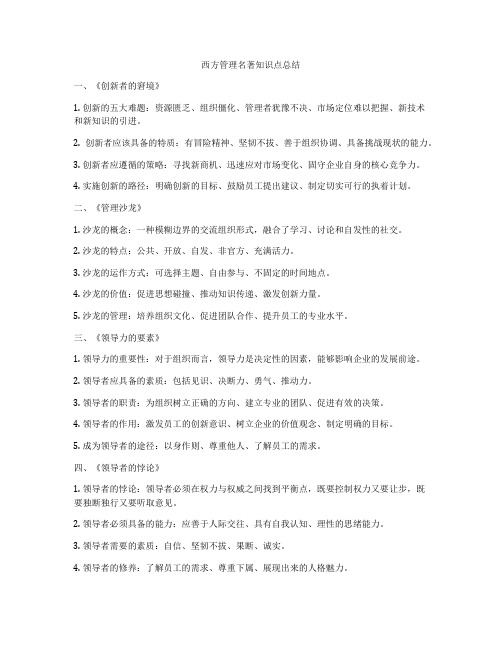
西方管理名著知识点总结一、《创新者的窘境》1. 创新的五大难题:资源匮乏、组织僵化、管理者犹豫不决、市场定位难以把握、新技术和新知识的引进。
2. 创新者应该具备的特质:有冒险精神、坚韧不拔、善于组织协调、具备挑战现状的能力。
3. 创新者应遵循的策略:寻找新商机、迅速应对市场变化、固守企业自身的核心竞争力。
4. 实施创新的路径:明确创新的目标、鼓励员工提出建议、制定切实可行的执着计划。
二、《管理沙龙》1. 沙龙的概念:一种模糊边界的交流组织形式,融合了学习、讨论和自发性的社交。
2. 沙龙的特点:公共、开放、自发、非官方、充满活力。
3. 沙龙的运作方式:可选择主题、自由参与、不固定的时间地点。
4. 沙龙的价值:促进思想碰撞、推动知识传递、激发创新力量。
5. 沙龙的管理:培养组织文化、促进团队合作、提升员工的专业水平。
三、《领导力的要素》1. 领导力的重要性:对于组织而言,领导力是决定性的因素,能够影响企业的发展前途。
2. 领导者应具备的素质:包括见识、决断力、勇气、推动力。
3. 领导者的职责:为组织树立正确的方向、建立专业的团队、促进有效的决策。
4. 领导者的作用:激发员工的创新意识、树立企业的价值观念、制定明确的目标。
5. 成为领导者的途径:以身作则、尊重他人、了解员工的需求。
四、《领导者的悖论》1. 领导者的悖论:领导者必须在权力与权威之间找到平衡点,既要控制权力又要让步,既要独断独行又要听取意见。
2. 领导者必须具备的能力:应善于人际交往、具有自我认知、理性的思绪能力。
3. 领导者需要的素质:自信、坚韧不拔、果断、诚实。
4. 领导者的修养:了解员工的需求、尊重下属、展现出来的人格魅力。
5. 面对领导者的悖论,领导者的策略:多方面倾听、多重反馈、敏锐的感知。
五、《执行力》1. 执行力的定义:能够兑现承诺,在实践中践行决策。
2. 执行力的重要性:决定着组织的成败,对核心业务的持续推动决定着企业的生存和发展。
西方管理思想史71知识讲解(89页)

2、科学的决策概念 狭义:指在几种行动方案中进行选择。
广义:包括在做出最后的选择之前必须进
行的一切活动。
决策就是人们为了达到一定目标,在掌握 充分的信息和对有关情况进行深刻分析的基 础上,用科学的方法拟定并评估各种方案, 从中选出合理方案的过程。
《管理理论丛林》 《再论管理理论丛林》
二、管理过程学派的管理思想
(一)研究对象 管理过程学派的研究对象是管理的过程
和职能。
(二)孔茨的职能管理
管理的各项职能,应划分 为计划、组织、人事、指挥和 控制等五项
单击此处编辑母版标
第三节 社会系统学派
题样式
单击此处编辑母版副标题样式
*
*
1
社会系统学派是从社会学的观 点来研究管理,认为社会的各级组 织都是一个协作的系统,进而把企 业组织中人们的相互关系看成是一 种协作系统。
一、权变理论学派概述
权变理论认为,在组织管理中要根 据组织所处的环境和内部条件的发展 变化随机应变,没有什么一成不变、 普遍适用、“最好的”管理理论和方 法。权变管理就是依托环境因素和管 理思想及管理技术因素之间的变数关 系来研究的一种最有效的管理方式。
(一)企业系统
企业系统由许多子系统构成 (二)系统观点、系统分析和系统管理
1、系统观点
2、系统分析就是对一个系统内的基本问题 用逻辑的思维推理,科学分析计算的方 法,在确定的或不确定的条件下,找出 各种可行的备择方案,加以分析比较, 进而选出一种最优的方案。
3、系统观点和系统分析可以应用 于各种资源的管理。把组织单位作 为系统来安排经营时,就叫系统管 理。
3、把管理中与决策有关的各种复杂因素 全部数量化,完全采用定量分析的方 法来解决复杂环境下的组织问题是不 现实的。
西方管理理论研究党校考试重点(2020年整理)
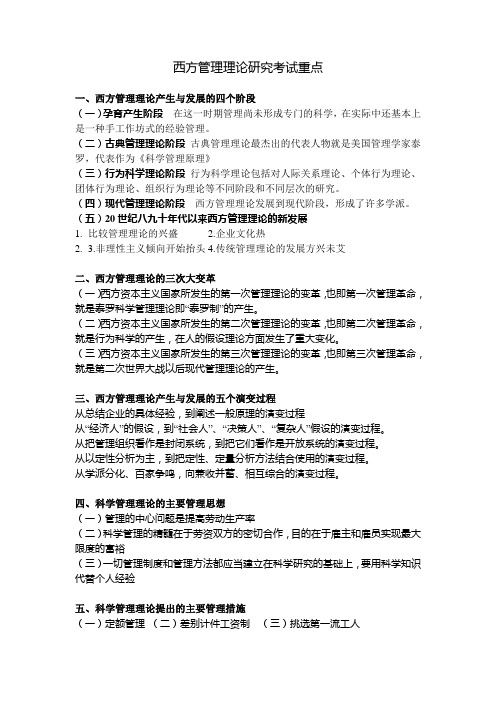
从把管理组织看作是封闭系统,到把它们看作是开放系统的演变过程。
从以定性分析为主,到把定性、定量分析方法结合使用的演变过程。
从学派分化、百家争鸣,向兼收并蓄、相互综合的演变过程。
四、科学管理理论的主要管理思想
(一)管理的中心问题是提高劳动生产率
二十一、组织发展的目的和特点
组织发展是指对一个组织内成员的态度、行为、价值观和各自的需要进行重塑。
目的:组织发展要与组织所处的环境相适应;组织发展要有助于改善组织中人的行为。
特点:组织发展是连续不断的提高过程;运用动态系统分析的观点促进组织发展;明确组织发展的目标与计划。
二十二、管理科学是一门揭示管理人员活动规律的科学,这门科学既有自己的核心知识,又有边界范围。
二十六、控制的含义与作用
就是指按照计划标准衡量计划的完成情况并纠正执行中的偏差,以确保计划指标实现的过程。
二十七、组织的本质表现为进行协作活动的人组成的系统。当正式组织运行正常而取得成功时,它的目标就能够实现。这时,这个组织是“有效的”。而组织的“效率”则不同,它是指组织中成员个人目标的实现程度。
二十八、非正式组织的积极作用
西方管理理论研究考试重点
一、西方管理理论产生与发展的四个阶段
(一)孕育产生阶段在这一时期管理尚未形成专门的科学,在实际中还基本上是一种手工作坊式的经验管理。
(二)古典管理理论阶段古典管理理论最杰出的代表人物就是美国管理学家泰罗,代表作为《科学管理原理》
(三)行为科学理论阶段组织行为理论等不同阶段和不同层次的研究。
(二)企业发展要保持长久不衰,必须重视双因素理论在管理中的应用;
(三)用期望理论有效地调动人地积极性,必须研究目标,全面理解效价,正确估计期望值;
西方管理理论(老爸曾经的复习)

西方管理理论简答题1、什么是目标管理P277德国人彼得〃德罗克于1954年提出了目标管理理论。
所谓目标管理,是使管理人员和广大职工在工作中实行自我控制并达到目标的一种管理技能和管理制度。
目标管理理论是经验主义理论在管理实践方面的一大贡献。
它综合了以工作为中心和以人为中心的管理技能和管理制度,解决了泰罗制重视动作分解而忽视工人劳动兴趣,把计划与执行分开等问题;同时也避免了行为科学偏重于以人为中心任务,忽视同工作相结合的弊端。
2、简述行为科学提示的人的行为的一般规律P84行为科学是研究人的行为规律的科学。
它所提示的有关人的行为的一般规律是:需求引发动机,动机产生行为,行为达到目标(结果)。
然后又产生新的需求,引发新的动机和行为。
这样的周而复始,使人的需求、动机、行为、目的不断增加、发展和提高。
行为科学理论最有名的是马斯洛的《需要层次理论》、奥尔德弗的《E、R、G理论》和麦克利兰的《成就需要理论》。
3、简述非正式组织的积极作用P219-220社会系统理论创始人巴纳德认为非正式组织就是“不属于正式组织的一部分,且不受其管辖的个人联系和相互作用以及有关的人们集团的总和。
”非正式组织的积极作用至少有以下三个:一、非正式组织具有促进信息传递的机能。
它就一些易于引起争论,不便于在正式渠道提出的、难以确定的事情、意见、建议、怀疑等,在成员之间交换意见。
二、非正式具有通过影响组织成员的协作意愿来维护正式组织内部团结的机能。
三、非正式组织具有保护个人人格和自尊心的机能,并且能抵制正式组织在这方面的不利影响。
非正式组织是正式组织的不可缺少的部分,其活动能使正式组织更有“效率”,并促进其更有“效力”。
4、简述企业文化的作用P369-37020世纪70年代末、80年代初,在西方管理理论研究中出现了一种非理性主义倾向,他们向传统管理理论提出了挑战,强调管理中“软”因素,鼓吹管理实务研究和企业文化,形成西方管理理论的一股新的潮流。
西方管理思想史笔记

管理思想的基本要素:人——是研究人类、组织和管理的基本分析单位。
组织——是个体能力的延伸,是满足个人无法实现的需要的一种群体结构。
管理——是有组织的人类活动中旨在协调组织内外环境中的各种关系,增强组织有效性管理思想研究所涉及的文化范围1、经济方面——是指人同资源的关系。
资源可能是人制造的,也可以是天然的;既包含着可被利用来实现某种既定目标的有形物质,同时也包含着人们的思想、努力等无形的资源。
资源稀少,而要实现的经济目的很多,所以,如何利用有限的资源生产、分配产品和劳务以及满足人们的多种需要,就必须有一个好的分配资源的方法。
2、社会方面——是指在一个特定的文化中,人与人的关系。
所有加入集体的人都要遵循一个“契约”,即为了维护该集体而定出关于如何行动的共同章程和协议。
这个不成文的但却具有约束力的“契约”对人们的行为以及应如何相处等作了规定3、政治方面——是指个人与国家的关系。
个人于改进的关系包括为建立社会秩序和保护生命财产而作出的法律和政治的安排。
维护秩序和纪律的政治机构可采取各种方式,民主制或专制制等都决定或影响了管理的方式。
管理思想及其特性1、管理思想就是人们对管理实践进行思考所形成的认识或知识体系,即人们运用所拥有的知识对组织内外环境的理解并由此产生的关于如何提高组织有效性的主张和看法。
2、管理经验是指管理实践者在反复实践中形成的对管理的个别认识。
他是管理思想的初级形态。
3、管理理论管理理论是对管理经验的理性概括和总结,是系统化的管理思想。
一般认为,管理理论产生于19世纪末20世纪初。
在此之前,管理思想就以经验的形式存在着。
4、管理哲学是在综合各类管理思想的基础上,探索人类管理的最高本质,揭示各种管理共同遵循的普遍规律,阐明管理的基本范畴和基本关系,提供认识管理和指导管理的根本方法;是管理中的世界观、认识论和方法论,是从思维和存在的角度对管理的本质和发展规律所作的哲学概括。
管理哲学是管理思想的最高理论形式。
西方管理制度理论
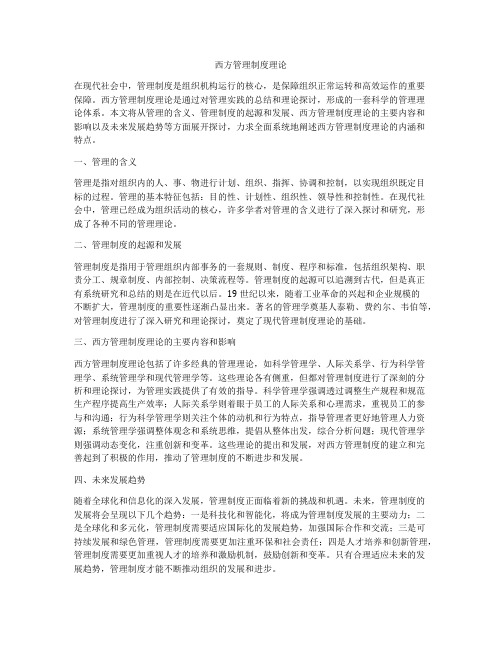
西方管理制度理论在现代社会中,管理制度是组织机构运行的核心,是保障组织正常运转和高效运作的重要保障。
西方管理制度理论是通过对管理实践的总结和理论探讨,形成的一套科学的管理理论体系。
本文将从管理的含义、管理制度的起源和发展、西方管理制度理论的主要内容和影响以及未来发展趋势等方面展开探讨,力求全面系统地阐述西方管理制度理论的内涵和特点。
一、管理的含义管理是指对组织内的人、事、物进行计划、组织、指挥、协调和控制,以实现组织既定目标的过程。
管理的基本特征包括:目的性、计划性、组织性、领导性和控制性。
在现代社会中,管理已经成为组织活动的核心,许多学者对管理的含义进行了深入探讨和研究,形成了各种不同的管理理论。
二、管理制度的起源和发展管理制度是指用于管理组织内部事务的一套规则、制度、程序和标准,包括组织架构、职责分工、规章制度、内部控制、决策流程等。
管理制度的起源可以追溯到古代,但是真正有系统研究和总结的则是在近代以后。
19世纪以来,随着工业革命的兴起和企业规模的不断扩大,管理制度的重要性逐渐凸显出来。
著名的管理学奠基人泰勒、费约尔、韦伯等,对管理制度进行了深入研究和理论探讨,奠定了现代管理制度理论的基础。
三、西方管理制度理论的主要内容和影响西方管理制度理论包括了许多经典的管理理论,如科学管理学、人际关系学、行为科学管理学、系统管理学和现代管理学等。
这些理论各有侧重,但都对管理制度进行了深刻的分析和理论探讨,为管理实践提供了有效的指导。
科学管理学强调透过调整生产规程和规范生产程序提高生产效率;人际关系学则着眼于员工的人际关系和心理需求,重视员工的参与和沟通;行为科学管理学则关注个体的动机和行为特点,指导管理者更好地管理人力资源;系统管理学强调整体观念和系统思维,提倡从整体出发,综合分析问题;现代管理学则强调动态变化,注重创新和变革。
这些理论的提出和发展,对西方管理制度的建立和完善起到了积极的作用,推动了管理制度的不断进步和发展。
- 1、下载文档前请自行甄别文档内容的完整性,平台不提供额外的编辑、内容补充、找答案等附加服务。
- 2、"仅部分预览"的文档,不可在线预览部分如存在完整性等问题,可反馈申请退款(可完整预览的文档不适用该条件!)。
- 3、如文档侵犯您的权益,请联系客服反馈,我们会尽快为您处理(人工客服工作时间:9:00-18:30)。
西方管理理论复习知识要点梳理1.Manager:Someone who works with and through other people by coordinating and integrating their work activities in order to accomplish organizational goals.2.Classifying Managers:①First-line Managers—Are at the lowest level of management and manage the work of non-managerial employees.②Middle Managers—Manage thework of first-line managers.③Top Managers :re responsible for making organization-wide decisions and establishing plans and goals that affect the entire organization.3.Managerial Concerns:①Efficiency-“Doing things right”Getting the most output for the least inputs;②Effectiveness-“Doing the right things”Attaining organizational goals.4.Management Four Functions:page 9;Management Roles:page 10;Management Skills:page 12.anization:A deliberate arrangement of people to accomplish some specific purposeCommon Characteristics of Organizations:①Have a distinct purpose;②Composed of people;③Have a deliberate structure.6.Why Study Management:①The universality of management;②The reality of work;③Rewards and challenges of being a manager. Rewards and Challenges of Being AManager:page19.7.Fredrick Winslow Taylor:The “father”of scientific management;Published Principles of Scientific Management (1911);The theory of scientific management Using scientificmethods to define the “one best way”for a job to be done:①Putting the right person on the job with the correct tools and equipment.②Having a standardized method of doing the job.③Providing an economic incentive to the worker.8.Taylor’s Five Principles of Management:①Develop a science for each element of anindividual’s work, which will replace the old rule-of-thumb method.②Scientifically select and then train, teach, and develop the worker.③Heartily cooperate with the workers so as to ensure that all work is done in accordance with the principles of the science that has been developed.④Divide work and responsibility almost equally between management and workers.⑤Management takes over all work for which it is better fitted than the workers.9.Frank and Lillian Gilbreth:①Focused on increasing worker productivity through the reduction of wasted motion;②Developed the microchronometer to time worker motionsand optimize performance.10.How Do Today’s Managers Use Scientific Management:①Use time and motion studies to increase productivity;②Hire the best qualified employees;③Design incentive systemsbased on output. Early Advocates of OB:page 3311.Max Weber:Developed a theory of authority based on an ideal type of organization (bureaucracy),Emphasized rationality, predictability, impersonality, technical competence, and authoritarianism.Fayol’s 14 Principles of Management:page 3012.The Hawthorne Studies:A series of productivity experiments conducted at Western Electric from 1927 to 1932;①Experimental findings-Productivity unexpectedly increased under imposed adverse working conditions;The effect of incentive plans was less thanexpected.②Research conclusion-Social norms, group standards and attitudes more strongly influence individual output and work behavior than do monetary incentives.13.The Systems Approach:page 35;The Contingency Approach:page36;A Process for Addressing Ethical Dilemmas:page 38;14.Quality Management:A philosophy of management driven by continual improvement in the quality of work processes and responding to customer needs and expectations;Inspired by the total quality management (TQM) ideas of Deming and Juran;Quality is not directly related to cost.15.What is Management Quality:①Intense focus on the customer;②Concern for continual improvement;③Process-focused;④Improvement in the quality of everything;⑤Accurate measurement;⑥Empowerment of employees.16.Omnipotent View of Management:①Managers are directly responsible for anorganization’s success or failure.②The quality of the organization is determined by the quality of its managers.③Managers are held most accountable for an organization’s performance yet it is difficult to attribute good or poor performance directly to their influence on the organization.17.Symbolic View of Management:①Much of an organization’s succes s or failure is due toexternal forces outside of managers’ control.②The ability of managers to affect outcomes is influenced and constrained by external factors.③Managers symbolize control and influence through their action.anizational Culture:A system of shared meanings and common beliefs held by organizational members that determines, in a large degree, how they act towards each other. Dimensions of Organizational Culture:page 5219.Managerial Decisions Affected by Character:⑴Planning:①The degree of risk that plans should contain.② Whether plans should be developed by individuals or teams.③The degree of environmental scanning in which management will engage.⑵Organizing:①Howmuch autonomy should be designed into employees’ jobs.②Whether tasks should be done by individuals or in teams.③The degree to which department managers interact with each other.⑶Leading:①The degree to which managers are concerned with increasing employee job satisfaction.②What leadership styles are appropriate.③Whether all disagreements—even constructive ones—should be eliminated.⑷Controlling:①Whether to impose external controls or to allow employees to control their own actions.②What criteria should be emphasized in employee performance evaluations.③ What repercussions will occur from exceeding one’s budget. How Employees Learn Culture:page 56.20.The External Environment:page 64;Selected U.S. Legislation Affecting Business:page 67;How the Environment Affects Managers:page 69;Environmental Uncertainty Matrix:page 69. Approaches to Being Green:page106.21.Decision:Making a choice from two or more alternatives.The Decision-Making Process:①Identifying a problem and decision criteria and allocating weights to the criteria.②Developing, analyzing, and selecting an alternative that can resolve the problem.③Implementing the selected alternative.④Evaluating the decision’seffectiveness.Evaluation of Franchise Alternatives Against Weighted Criteria:page137(计算); Expected Value for Revenues from the Addition of One Ski Lift:page146(计算); Types of Problems, Types of Decisions, and Level in the Organization:page144(图表); Decision-Making Styles:page147.22.Types of Programmed Decisions:①A Policy-A general guideline for making a decisionabout a structured problem.②A Procedure-A series of interrelated steps that a manager can use to respond (applying a policy) to a structured problem.③A Rule-An explicit statement that limits what a manager or employee can or cannot do in carrying out thesteps involved in a procedure.23.Unstructured Problems:①Problems that are new or unusual and for which information is ambiguous or incomplete.②Problems that will require custom-made solutions. Nonprogrammed Decisions:①Decisions that are unique and nonrecurring.②Decisionsthat generate unique responses.24.Characteristics of an Effective Decision-Making Process:①It focuses on what isimportant.②It is logical and consistent.③It acknowledges both subjective and objective thinking and blends analytical with intuitive thinking.④It requires only as much information and analysis as is necessary to resolve a particular dilemma.⑤It encourages and guides the gathering of relevant information and informed opinion.⑥It is straightforward, reliable, easy to use, and flexible.25.Planning:A primary functional managerial activity that involves:①Defining the o rganization’s goals;②Establishing an overall strategy for achieving those goals;③Developing a comprehensive set of plans to integrate and coordinate organizational work.26.Purposes of Planning:①Provides direction;②Reduces uncertainty;③Minimizes waste and redundancy;④Sets the standards for controlling.27.How Do Managers Plan:Goals-Desired outcomes for individuals, groups, or entire organizations,Provide direction and evaluation performance criteria;Plans-Documents that outline how goals are to be accomplished,Describe how resources are to be allocated and establish activity schedules.28.Types of Goals:①Financial Goals-Are related to the expected internal financial performance of the organization.②Strategic Goals-Are related to the performance of the firm relative to factors in its external environment.③Stated Goals versus Real Goals-Broadly-worded official statements of the organization (intended for public consumption) that may be irrelevant to its real goals (what actually goes on in the organization).29.Stated Objectives from Large U.S. Companies:page 161;Types of Plans:page 162-163.Establishing Goals and Developing Plans:page164;Steps in a Typical MBO Program:165;30.Management By Objectives (MBO):①Specific performance goals are jointlydetermined by employees and managers.②Progress toward accomplishing goals is periodically reviewed.③Rewards are allocated on the basis of progress towards thegoals.Key elements of MBO:Goal specificity, participative decision making, an explicit performance/evaluation period, feedback31.Reason for MBO Success:Top management commitment and involvement,Potential Problems with MBO Programs:①Not as effective in dynamic environments that requireconstant resetting of goals.②Overemphasis on individual accomplishment may create problems with teamwork.③Allowing the MBO program to become an annual paperwork shuffle.32.Strategic Management:The set of managerial decisions and actions that determinesthe long-run performance of an organization.33.Why Strategic Management Is Important:①It results in higher organizational performance.②It requires that managers examine and adapt to business environment changes.③It coordinates diverse organizational units, helping them focus on organizational goals.④It is very much involved in the managerial decision-making process.The Strategic Management Process:page 182.Corporate Portfolio Analysis:page 189-190(BCG Matrix)Classifies firms as:①Cash cows: low growth rate, high market share;②Stars: high growth rate, high market share;③Question marks: high growth rate, low market share;④Dogs: low growth rate, low market share.34.Corporate-Level Strategies:Top management’s overall plan for the entire organization and its strategic business units.Types of Corporate Strategies:①Growth Strategy: Seekingto increase the organization’s b usiness by expansion into new products and markets.②Stability Strategy: A strategy that seeks to maintain the status quo to deal with the uncertainty of a dynamic environment, when the industry is experiencing slow- or no-growth conditions, or if the owners of the firm select not to grow for personal reasons.③Renewal Strategies: Developing strategies to counter organization weaknesses that are leading to performance declines.Forces in the Industry Analysis:page 193-193(Five Competitive Forces)First-Mover Advantages–Disadvantages:(page 199). 35.Global Scanning:①Screening a broad scope of information on global forces that mightaffect the organization.②Has value to firms with significant global interests.③Draws information from sources that provide global perspectives on world-wide issues andopportunities.36.Forecasting:The part of organizational planning that involves creating predictions ofoutcomes based on information gathered by environmental scanning.Types of Forecasting:①Quantitative forecasting-Applying a set of mathematical rules to a series ofhard data to predict outcomes.②Qualitative forecasting-Using expert judgments and opinions to predict less than precise outcomes.Forecasting Techniques:page 209.37.Benchmarking:The search for the best practices among competitors and noncompetitors that lead to their superior performance.The Benchmarking Process:page211.(Steps in Benchmarking);Types of Budgets:page 212-21338.Schedules:Plans that allocate resources by detailing what activities have to be done, the order in which they are to be completed, who is to do each, and when they are to be completed.A Gantt Chart:page 213-214(A Load Chart)39.PERT Network:A flow chart diagram that depicts the sequence of activities needed to complete a project and the time or costs associated with each activity.page 215;A PERT Network for Constructing an Office Building:page 216-217(A PERT Network forConstructing an Office Building;Breakeven Analysis);Production Data for Cinnamon-Scented Products:page218(计算)40.Project Management:The task of getting a project’s activities done on time, within budget, and according to specifications.Project Planning Process:page 219;Some Purposes of Organizing:page 234;41.Work Specialization:The degree to which tasks in the organization are divided into separate jobs with each step completed by a different person.42.Span of Control:The number of employees who can be effectively and efficiently supervised by a manager.Factors that Influence the Amount of Centralization:page 240;Formalization:The degree to which jobs within the organization are standardized and the extent to which employee behavior is guided by rules and anizational Design Decisions:page 241;Woodward’s Findings on Technology, Structure, and Effectiveness:page 243;Strengths and Weaknesses of Common Traditional Organizational Designs:page 244;Characteristics of a Learning Organization:page 249 munication:The transfer and understanding of meaning.Interpersonal Communication:Communication between two or more people;Organizational Communication:All the patterns, network, and systems of communicationswithin an organization.page 256-25744.Interpersonal Communication Methods:page 260; Interpersonal Communication Barriers:page 262(Barriers to Effective Interpersonal Communication);Active Listening Behaviors:page 265(Overcoming the Barriers to Effective Interpersonal Communications)45.Formal Communication:Communication that follows the official chain of command or is part of the communication required to do one’s rmal Communication:Communication that is not defined by the organization’s hierarchy.Types of Communication Networks:page 268;46.The Importance of Human Resource Management (HRM):①Necessary part of the organizing function of management,②As an important strategic tool:HRM helps establish an organization’s sustainable competitive advantage.③Adds value to the firm:High performance work practices lead to both high individual and high organizational performance.High-Performance Work Practices:page 28347.Functions of the HRM Process:①Ensuring that competent employees are identifiedand selected.②Providing employees with up-to-date knowledge and skills to do their jobs.③Ensuring that the organization retains competent and high-performing employees who are capable of high performance.Major U.S. Federal Laws and Regulations Relatedto HRM:page 28448.Human Resource (HR) Planning:The process by which managers ensure that they have the right number and kinds of people in the right places, and at the right times, who are capable of effectively and efficiently performing their tasks.Steps in HR planning:①Assessing current human resources.②Assessing future needs for human resources.③Developing a program to meet those future needs.49.Job Analysis:An assessment that defines a job and the behaviors necessary to perform the job.Job Description:A written statement of what the job holder does, how it is done, and why it is done.Job Specification:A written statement of the minimum qualifications that a person must possess to perform a given job successfully.Major Sources of Potential Job Candidates:page 287;Decruitment Options:288(Selection Decision Outcomes);Suggestions for Interviewing:page 291;Quality of Selection Devices as Predictors:293; Types of Training:page 294-295(Employee Training Methods);Performance Appraisal Methods:296;Factors That Influence Compensation and Benefits:page 298;T op 10 Job Factors for College Graduates:page300;Contemporary HRM Issues:page 301.50.Performance Management System:A process establishing performance standards and appraising employee performance in order to arrive at objective HR decisions and to provide documentation in support of those decisions.anizational Change:Any alterations in the people, structure, or technology of an organization.Characteristics of Change:①Is constant yet varies in degree anddirection;②Produces uncertainty yet is not completely unpredictable;③Creates both threats and opportunities.Managing change is an integral part of every manager’s job. 52.Change Agents:People who act as catalysts and assume the responsibility for changing process are called change agents.Types of Change Agents:①Managers: internal entrepreneurs;②Nonmanagers: change specialists;③Outside consultants: change implementation experts.White-Water Rapids Metaphor:The lack of environmental stability and predictability requires that managers and organizations continually adapt (manage change actively) to survive.Three Categories of Change:page 317Organizational Development Techniques:page 31953.Why People Resist Change:①The ambiguity and uncertainty that change introduces②The comfort of old habits;③A concern over personal loss of status, money, authority, friendships, and personal convenience;④The perception that change is incompatible with the goals and interest of the organization.The Road to Cultural Change:page 323.54.Stress:The physical and psychological tension an individual feels when confronted with extraordinary demands, constraints, or opportunities and their associated importance and uncertainties.Symptoms of Stress:page 32455.Reducing Stress:①Engage in proper employee selection;②Match employees’ KSA’s to jobs’ TDR’s;③Use realistic job interviews for reduce ambiguity;④Improve organizational communications;⑤Develop a performance planning program;⑥Use job redesign;⑦Provide a counseling program;⑧Offer time planning management assistance;⑨Sponsor wellness programs.56.Making Change Happen Successfully:①Embrace change—become a change-capable organization.②Create a simple, compelling message explaining why change is necessary.③Communicate constantly and honestly.④Foster as much employee participation as possible—get all employees committed.⑤Encourage employees to be flexible.⑦Removethose who resist and cannot be changed.Innovation Variables:page 32957.Creativity:The ability to combine ideas in a unique way or to make an unusual association.Innovation:Turning the outcomes of the creative process into useful products, services, or work methods.Characteristics of Change-Capable Organizations:page 326. 58.Employee Productivity:A performance measure of both efficiency and effectiveness; Absenteeism:The failure to report to work when expected;Turnover:The voluntary and involuntary permanent withdrawal from an organization;page 342-343.anizational Citizenship Behavior (OCB):Discretionary behavior that is not a part of an employee’s formal job requirements, but which promotes the effective functioning of the organization.Job Satisfaction:The individual’s general attitude toward his or her job. 60.Attitudes:Evaluative statements—either favorable or unfavorable—concerning objects,people, or events.page 344-345.Job Satisfaction:Job satisfaction is affected by level of income earned and by the type of job a worker does.①For individuals, productivity appears to lead to job satisfaction.②For organizations, those with more satisfied employees are more effective than those with less satisfied employees.61.Actions to increase job satisfaction for customer service workers:①Hire upbeat and friendly employees.②Reward superior customer service.③Provide a positive work climate.④Use attitude surveys to track employee satisfaction.Job Involvement:Thedegree to which an employee identifies with his or her job, actively participates in it, and considers his or her performance to be important to his or her self-worth.anizational Commitment:Is the degree to which an employee identifies with a particular organization and its goals and wishes to maintain membership in the organization.Perceived Organizational Support:Is the general belief of employees that their organization values their contribution and cares about their well-being.63.Attitude Surveys:A instrument/document that presents employees with a set of statements or questions eliciting how they feel about their jobs, work groups, supervisors, or their organization.64.Implication for Managers:①Attitudes warn of potential behavioral problems: Managers should do things that generate the positive attitudes that reduce absenteeism and turnover.②Attitudes influence behaviors of employees:Managers should focus on helping employees become more productive to increase job satisfaction.③Employees will try to reduce dissonance unless:Managers identify the external sources of dissonance.Managers provide rewards compensating for the dissonance.Personality:The unique combination of psychological characteristics (measurable traits) that affect how a person reacts and interacts with others.page 349-35165.Emotional Intelligence:An assortment of noncognitive skills, capabilities, and competencies that influence a person’s ability to succeed in coping with environmentaldemands and pressures.The Big Five Model:page 352;Holland’s Typology of Personalityand Sample Occupations:page 356;66.Perception:A process by which individuals give meaning (reality) to their environment by organizing and interpreting their sensory impressions.Factors influencing perception: ①The perceiver’s personal characteristics—interests, biases and expectations;②The target’s characteristics—distinctiveness, contrast, and similarity);③The situation (context) factors—place, time, location—draw attention or distract from the target.67.Attribution Theory:How the actions of individuals are perceived by others depends on what meaning (causation) we attribute to a given behavior.page 358-359;Learning:Any relatively permanent change in behavior that occurs as a result of experience.page 360-361.68.Motivation:The result of the interaction of a person’s internal needs and externalinfluences---involving perceptions of quality, expectancy, previous conditioning, and goal setting--- and determining behavior.Content theories:It is a group of motivation theories emphasizing the needs that motivate people.Process theories:It is a group of theories that explain how employees choose behaviors to meet their needs and how they determine whether their choices are successful. Managers Versus Leaders:page 42269.Herzberg’s Two-Factor Theory:①Hygiene factors:They refer to maintenance factors, such as salary, status, working conditions, which do not relate directly to a person’s actualwork activity, but when of low quality are the cause of unhappiness on the job.②Motivation factorsThey refer to the conditions, intrinsic to thejob, that can lead to an individual’s jobsatisfaction.page 393-394 ★70.Theory X:It is a philosophy of management with a negative perception of subordinates’potential for and attitude toward work.Theory Y:It is a theory of management with a positive perception of sublimates’potential for an attitude toward work. Page 394 ★71.Managerial Grid:Appraises leadership styles using two dimensions:Concern for people Concern for production.The Managerial Grid:page 425-426.72.The Fiedler Model:Proposes that effective group performance depends upon the proper match between the leader’s style of interacting with followers and the degree to which the situation allows the leader to control and influence.73.Hersey and Blanchard’s Situational Leadership Theory (SLT):Argues that successfulleadership is achieved by selecting the right leadership style which is contingent on the level of the followers’readiness. Acceptance: leadership effectiveness depends on whether followers accept or reject a leader.Readiness: the extent to which followers have08营销(2)班内部资料仅供期末复习参考 - 11 - the ability and willingness to accomplish a specific task.Hersey and Blanchard ’s Situational Leadership Model:page 428-429.Leadership Styles: Vroom Leader Participation Model:page 430. 74.Path-Goal Model:States that the leader ’s job is to assist his or her followers in attaining their goals and to provide direction or support to ensure their goals are compatible with organizational goals.Path-Goal Theory:page 432 75.Transactional Leadership:Leaders who guide or motivate their followers in the direction of established goals by clarifying role and task requirements.page 433.Charismatic Leadership:An enthusiastic, self-confident leader whose personality and actions influence people to behave in certain ways.Visionary Leadership:A leader who creates and articulates a realistic, credible, and attractive vision of the future that improves upon the present situation.Heroic Leadership(Basics of Leadership):page 445. 76.Control:The process of monitoring activities to ensure that they are being accomplished as planned and of correcting any significant deviations.Market Control:Emphasizes the use of external market mechanisms to establish the standards used in the control system.page 458-459.77.Why Is Control Important:As the final link in management functions:Planning 、Empowering employees 、Protecting the workplace.page 459-460(The Planning –Controlling Link) Popular Financial Ratios:47078.The Control Process:①Measuring actual performance.②Comparing actual performance against a standard.③Taking action to correct deviations or inadequate standards.page mon Sources of Information for Measuring Performance:page 461.Managerial Decisions in the Control Process:page 465.79.Feedforward Control:A control that prevents anticipated problems before actual occurrences of the problem.Concurrent Control:A control that takes place while the monitored activity is in progress.page 468-469(Types of Control)80.Steps to Successfully Implement an Internal Benchmarking Best Practices Program:page 474;Control Measures for Employee Theft or Fraud:page 478。
